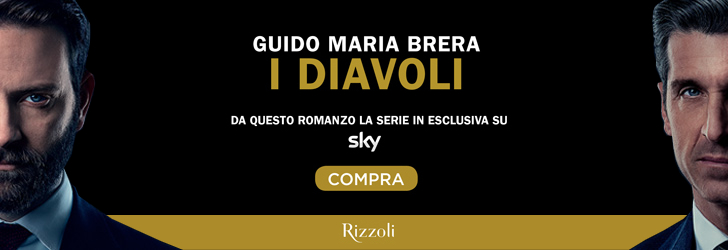
Decodificare il presente, raccontare il futuro
TREDICESIMO-PIANO
lun 29 marzo 2021
THE LAST MAN AND THE DIGITAL ORDER
Phil observes the solitary silhouette on the pier, his tiny and motionless figure in front of the giant metal volumes all around, regulated by the new digital order. Francis Fukuyama said that history was over and that “the last man” would be the prototype of the liberal. He was wrong: we may not yet know the real “last man”, but we do know that Fukuyama’s one has failed.
For Professor Philip Wade, the character in Devils (back in bookshops in the new Rizzoli edition to mark the release of the TV series of the same name) and melancholy protagonist of Guido Maria Brera’s The End of Time (La fine del tempo, edited by La Nave di Teseo), the dawn of the new digital order also marks the return of a new, inescapable clash between capital and labour.
Seafort Dock, Liverpool, England. Today.
Each return stirs time like water in a whirlwind. Philip Wade is home again. Liverpool, the Seafort Dock. The northern end of the harbour front, north of the Mersey estuary. The old heart of the working class, where the power of the dockers pulsated. Where space crumples, where the past grabs the future. The port of Liverpool, the shipping routes. The ancient epic of the dockers, and the applications of technology. Machines and human beings. Technology and work. Yesterday and tomorrow, in a suspension of today between what is no longer and what is yet to be. Nothing is ever really over, and capitalism is a black hole in which different temporalities collapse beyond the event horizon.
Yesterday and tomorrow, in a suspension between what is no longer and what is yet to be.
Phil the Red is home again. He has used the excuse of researching global trade routes at the time of the pandemic to get a pass from his Unions comrades and access the port area. Professor Wade, the passionate history lecturer at Birkbeck College. Phil, the working class son raised on bread and labour. The man from a bygone era, disappointed and never defeated. He wanders, weighed down by the years, wearing a crash helmet and a fluorescent vest, near the gates. He observes his surroundings as one observes a world that is both familiar and different.
The Johnson government has turned the port into a free zone, with favourable tax regimes, few controls and no customs charges. Frantic and organised trucks move in front of him. It feels like watching the activity of an anthill, built of gleaming steel and tyre rubber, like the manoeuvres of the drivers and the gestures of the foremen who direct their action are automatic and eternal.
This junction of the flow of goods, this temple of logistics, is a privileged observatory. From here, Philip does not see the leaden sky or the churning sea. From here, he can see the secret watermark of the capital’s planetary networks. Nothing seems to have changed, even though the pandemic has upset everything. The gears of the mechanical devices look the same as ever, the inorganic goods seem immune to the virus.
The new digital order has not even scratched the pandemic.
Still, Philip feels like these months have shown that global free trade has not eliminated the danger. That the collective immune system has never been so weak and lacking in antibodies against catastrophe. The new digital order, according to Professor Wade, has not even scratched the pandemic. Against the virus, the Western world has been unable to use the much-vaunted technology, lost in the controversy over the pervasiveness of surveillance capitalism, while authoritarian regimes in Asia have applied heavy disciplinary measures to limit its impact.
Technoenthusiasts, Professor Wade reflects, nevertheless remain devoted to algorithms that promise to improve lives, only to make human behaviour increasingly predictable and easily influenced. Candidly, millions of people synthesise their existence into a string of big data, in the hope of receiving dividends: of improving their material conditions. Unfortunately, there is no correlation between prosperity and technology.
Fifteen minutes later
Wheels turning, dragging massive trucks. Trailers sliding over automated rails. Vehicles parked just right and then hooked by metal structures, which unload the goods transported there. On top of it all, cranes rise up like Filippo Tommaso Marinetti’s mechanical giraffes. Professor Wade became interested in Futurism, as something exotic and distant, when he was a young student in Rome, attending Federico Caffè’s lectures. One truck after another, the same operation is performed on each one. In the terminal, the containers end up neatly on the ground, in long, towering rows.
Here is Pasolini’s “Dream of a Thing”, capital version: that mirage that makes it possible for capital itself to exist without labour power. Here is the container, which erased the ancient wisdom of the dockers to occupy the space available in the holds — the stowage of cargo. That process involved technique and creativity, the experience of a thousand dawns against the salty wind. Apart from the truck driver and the docker who helps manoeuvre, the workforce now seems to have been expelled from the process, the bodies vanished. Erased. The world no longer smells of the blood, just like in the time of social battles: the present is neutral to the sense of smell, anaesthetic.
Yet the one great certainty is that the clash between capital and labour is returning.
Once upon a time, every innovation of capital was accompanied by a workers’ struggle that dictated to the other side a deviation, a paradigm shift. Today, the liberal model is converging towards the authoritarian model, in the name of a technological progress free from the pressures of cycles of conflict. The militant bubbles of social networks burst in impotence, in the inability to make a serious impact. What really works is the construction of consensus, the formatting of an ideology that eliminates otherness and opposition. Those who have prostrated themselves to the new digital order find themselves without points of reference, clutching at a crazy compass that marks no direction.
The one great certainty is that the clash between capital and labour is returning. Together with flesh and bodies. A clash that Philip Wade remembers. And, in front of the coloured containers and the mechanical arms that lift them, he says to himself that perhaps the memories of the struggles have remained in the inorganic of metal and stone. In the non-human forms that animate the port of his city. He tells himself that in the realm of devices and mechanics, even here, traces of a distant time can endure. Memories of dockers’ bodies in motion, biceps under strain, backs wet with sweat pulsate here. The speeches, rallies, discussions on the politics of the working class that — ten years after the defeat of the miners — tried to endure, survive as fragments in the air.
Phil the Red cannot forget the twenty-eight months of struggle that began in 1995. The clashes, the lock-outs, the living soul of the British dockers. It seems impossible to him that a quarter of a century has passed. Impossible to think that that compact group of workers is so remote. A community that guarded the heart of the working class and fought not to have its rights taken away. He cannot imagine the jackets that protected those bodies from the wind being worn out. Big shoulders being bent over, those serious faces facing the police being aged by time.
Thirty minutes later
Philip observes the operations loading containers onto the docked cargo ship. Hands in his pockets, in the deep shadow that covers the dock from the ship. No technology, he thinks, will be able to rebalance the components. After all, there is nothing technological about the gig economy: it is the most basic exploitation of old-style labour. The algorithm that directs the riders hides a cartel of companies that rob workers and make them slaves. This is not the third millennium, but the cotton fields of Virginia in the early nineteenth century.
So the gig economy comes before Fordism, even if it is regulated by an algorithm.
Covering the sky, mechanical cranes remind him of Marinetti’s Mafarka. The organisation of this port at the forefront of modernity has ancient roots, nourished by the blood of slaves imprisoned in the holds. Professor Wade shakes his head, observing the exact dynamics that animate the quay. Logistics at the time of travel to Mars is based on the barbarity of the slave trade. The man-trade.
So the gig economy comes before Fordism, even if it is regulated by an algorithm. It is as old as slavery. It flourishes in countries that exploit labour as they did in the nineteenth century. The new slaves walk through the shadows of the Western metropolises and at the same time work in the production chains of the large manufacturing companies.
On a dock in the distance a worker, the only one visible in the vast area, watches the mechanical movements around the cargo. Phil was a boy when the computer system of the Seafort Dock began to control every step of loading and unloading at the container terminal. He shifts his gaze to the toy-coloured parallelepipeds. Capital is looking for a new virginity, he says to himself. And so in Europe they talk about the Recovery Plan. And in the world of finance, everything has to be ESG in order to intercept new flows of capital.
ESG, environmental, social and corporate governance: nothing but a big washing machine of the corporate culture of the last hundred years. A centrifuge that claims to strip away what big business has generated: environmental destruction, gender discrimination and social inequality. So the routes of capital are being hijacked to appease popular anger. But for the transformation to have any credibility, a fundamental element is missing: a global legislator able to intervene in local labour and immigration laws. Until such a transformation takes place, the digital order will continue to be based on ancient norms, on the inhuman and present legacies of a remote time.
The operations come to an end, Philip realises. Vehicles pull away from the quay with no more containers, suddenly bare. Up there in the freighter, the loaded goods are about to make their journey in the middle of the sea. Everything is in its place, but Professor Wade cannot leave calmly.
A centrifuge that claims to undo what big business has created: environmental destruction, gender discrimination, social inequality.
Philip mulls over the way the new digital order distributes stock options to employees, who become happy shareholders, but destroys the city. It excludes millions of people from the old urban realities, as it cannibalises everything. It moves house prices, disrupts the lives of their inhabitants, depending on the stock market performance of companies.
The new digital order, however, will have to reckon with the return of bodies at the dawn of a post-pandemic world, which can already be glimpsed in the great rise in raw materials and steel, and in the recovery of shipping. Ports such as Seafort Dock will once again become crucial hubs, while the new generations are starting to think about trade unions and new forms of organisation: real, no longer virtual. Moreover, health care will have to be the pillar of another welfare system, the starting point for the creation of a strategic investment for the future.
Phil looks at the lone man on the pier, his tiny, motionless figure in front of the volumes of metal towering all around. Francis Fukuyama said that history was over and that “the last man” would be the prototype of the liberal. He was wrong: we may not yet know the real “last man”, but we do know that Fukuyama’s one has failed.

